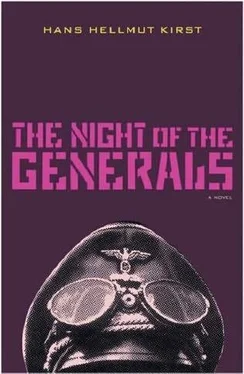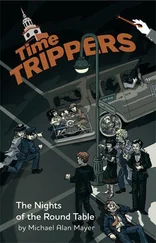“He used to sit in the back seat and lower a whole bottle of brandy inside two hours,” Hartmann said. “But he didn’t show it. He just held himself straighter and spoke clearer. He could drink like a fish.”
“He still can,” Wyzolla declared with a touch of pride. “Except that he hardly ever drinks brandy these days. Brandy’s in short supply with us, you know, but there’s plenty of vodka. The General keeps cases of the stuff in his quarters.”
Hartmann took secret pleasure in the fact that Wyzolla was already addressing him with the familiar “du.” It showed that he had gained his confidence, which was exactly what Prévert had instructed him to do.
“You’re on a cushy number,” he told Wyzolla. “Your cars are shoddy old tin cans—you can’t be expected to put much of a shine on them. Back in Paris I was driving a Bentley. Every grain of dust showed up. I had a whole collection of stuff in the boot—linen cloths, woollen cloths, leathers, sponges, brushes and so on.”
“So have I!” Wyzolla assured him vehemently. He seemed to regard Hartmann’s aspersions on his range of cleaning materials as an affront to his honour. “Three sets—one in use and two in reserve.”
“What about women?” asked Hartmann.
“Women?” Wyzolla shook his head in disapproval. “The General doesn’t go for anything like that.”
“That’s what I always thought,” Hartmann said confidentially. “He never seemed to notice them—and there were some real smashers in Paris, I can tell you.”
“We don’t do too badly in Dresden,” said Wyzolla.
“He did pick one up once, though, in Paris.”
“Well, he’s only a man—out of the ordinary, but a man like anyone else. I’ve been driving him for two years now, and as far as I know he’s only been on the job once in all that time.”
“When was that?”
“A couple of days ago. I drove him to some bar or other and he picked up a tart there. I took both of them back to her flat.”
“Did you wait?”
“Yes, but I didn’t have to wait long. About half an hour later he came rushing back. Just flopped down on the back seat and told me to take him home. It was funny, he sounded quite mild for a change. Hasn’t touched a drop or smoked a cigarette ever since.”
Hartmann nodded thoughtfully and Wyzolla looked gratified at his reaction, but they had no opportunity to continue their edifying conversation. At that moment, Ulrike appeared in the doorway leading to the Green Salon.
“It’s time,” she said. “Prévert has given the signal.”
“We’ve never met in person before,” Prévert said to Tanz, “but you’re not unknown to me.”
“I, too,” said Tanz, endeavouring to be sociable, “have a feeling that I’ve heard your name before, but I can’t place it.”
“I work for the Sûreté,” said Prévert, “in Paris.”
“My knowledge of Paris is limited to the war. I was there in nineteen forty-four.”
“In those days,” said Prévert, “my task was to provide a link between the French and German authorities—eliminate friction between them, and so on.”
“An interesting job, I’m sure,” Tanz said, polite as ever.
Feeling instinctively that this line of conversation might be less innocuous than it seemed on the surface, von Seydlitz-Gabler made an attempt to cut it short. He was skilfully distracted by Kahlenberge, who started talking about a foreword for something he was writing and his need to find someone with sufficient reputation and expert knowledge to supply it—for a suitable fee, of course. He had immediately thought of von Seydlitz-Gabler, and would appreciate his comments on the subject. Flattered by this display of confidence, von Seydlitz-Gabler allowed himself to be drawn into a corner.
Meanwhile, Prévert and Tanz eyed each other steadily, each man attempting to smile but neither succeeding to any marked degree. Tanz saw two frog-like eyes and a fish-like mouth set in a wrinkled expanse of flesh. Prévert saw an ideal model for a sculptor who wanted to portray the essence of unflinching, adamantine heroism. Everything about Tanz seemed big, impressive and imbued with classical beauty, though his face bore a few deep lines which looked as if they had been carved into it with a razoredged knife.
“In those days,” Prévert said cautiously, “I worked with a certain Lieutenant-Colonel Grau. Perhaps the name rings a bell?”
“It does,” said Tanz. He stepped back slighly, as though to get a better view of Prévert.
“A remarkable man, Grau.” Prévert leant forward as though anxious not to increase the distance between himself and Tanz. “He was obsessed with a strange craving for absolute justice. His arguments and methods were quite out of the ordinary.”
“I’m unable to share your enthusiasm,” said Tanz. His eyes glinted frostily like slivers of ice. He raised his right hand, only to let it fall again in an attempt to disguise the fact that it was trembling violently. “And now—if you’ll excuse me.”
“One moment, please!” Prévert moved fractionally so that his corpulent body blocked Tanz’s route of escape. “Perhaps you’ll find our little chat considerably more interesting when I tell you that in July nineteen forty-four I was responsible for investigating a murder in the Rue de Londres.”
Tanz froze. His eyes had gone as blank as the windows of a deserted house.
“I’m not interested,” he said eventually.
“Even if I can prove that the crime in the Rue de Londres exists in triplicate?”
“You’re insane.”
“I might reciprocate that,” said Prévert.
“What do you want?” asked Tanz with scarcely suppressed fury. “You’re becoming a nuisance. I won’t tolerate it.”
“Warsaw nineteen forty-two, Paris nineteen forty-four, Dresden nineteen fifty-six. Need I say more?”
Tanz looked as though he were on the point of collapse. His body lost its unwavering poise. He tottered backwards into the wall behind him and leant against it, a ruined marble column.
Even then, his square Jaw jutted pugnaciously and his parted lips seemed to suck energy from the surrounding air. When he spoke again, his voice had regained its crystalline clarity.
“Kindly spare me your theories. You can’t prove anything. It’s all guesswork.”
Prévert glanced across at Ulrike and raised his hand. This was the signal for Hartmann’s appearance. Ulrike nodded and disappeared.
“You’ve spent the past twelve years in the East,” he said, turning back to Tanz, “and now you want to change sides. A lot of people look on this as a triumph of conscience—an action worthy of respect. They’re even ready to fête you for it.”
’"And you dislike this?”
“I dislike it very much indeed, Herr Tanz. You see, I can’t regard it as mere coincidence that the murder committed in Dresden the other day was an exact replica of the murders in Paris and Warsaw.”
“Pure speculation!” Tanz exploded.
“I don’t agree with you.” Prévert’s manner was irritatingly serene. “There are a number of facts which add up to something more than coincidence. For example, two detectives from the Eastern Zone tried to get into conversation with your orderly this afternoon. They were arrested by the West Berlin police, who are now taking an interest in you. You won’t be particularly impressed by all this, but perhaps it may interest you to know that this afternoon a conference took place between Detective-Inspector Liesowski of Warsaw, Detective-Inspector Liebig of Dresden and myself. We reached a unanimous decision.”
“Suppositions aren’t evidence.” Tanz’s voice sounded muffled, as though he were speaking through a piece of baize.
“I agree with you there,” said Prévert imperturbably. “Nothing I’ve said so far is capable of proof. The Warsaw case is still open, the Dresden case is unsolved, and in the Paris case the vital witness doesn’t appear to be forthcoming.”
Читать дальше












